
Conference Keynote Speaker Peter Jennings AO PSM


Conference Keynote Speaker Peter Jennings AO PSM
Trump, Putin and Xi Jinping - how three wildcards are overturning global security
Page 18


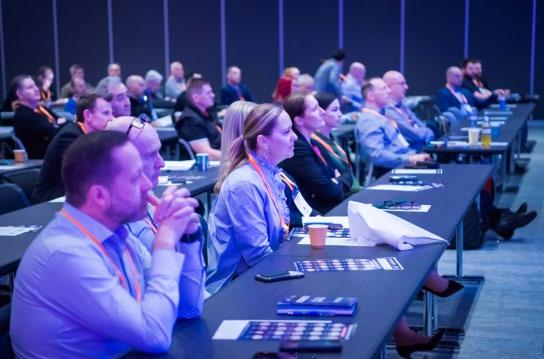


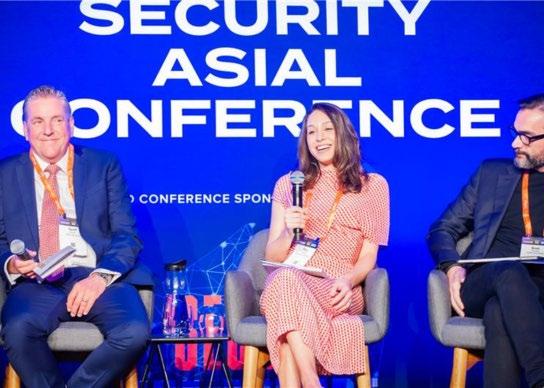












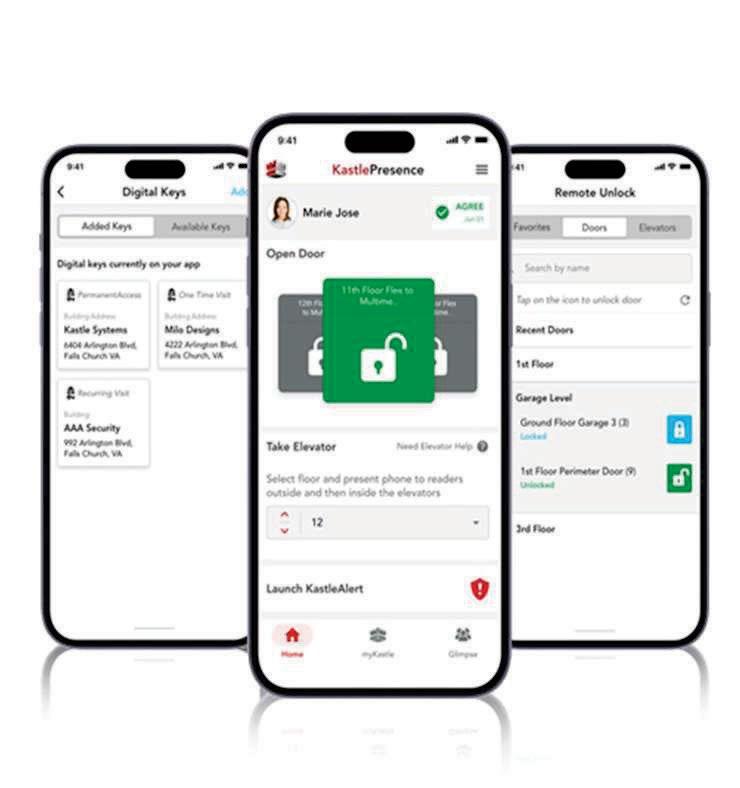
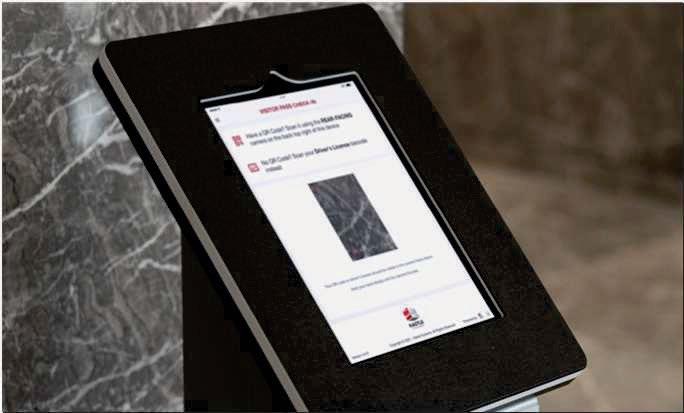

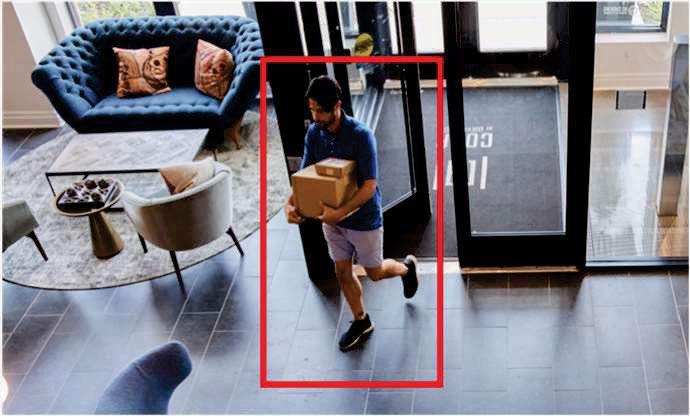







Dear Members,
Welcome to the latest edition of our industry magazine. As always, it’s a pleasure to connect with our members and reflect on the progress, challenges and priorities that shape Australia’s private security industry.
There is no doubt that the pace of change across our sector continues to accelerate. Across the country, we continue to see growing recognition of the critical role security professionals play in safeguarding people, assets, and infrastructure. Whether it’s protecting retail precincts, health facilities, data centres, or critical infrastructure, the work of our members is essential to the daily functioning of our society. Behind every guard, technician, monitoring operator or integrator is a deep responsibility, and a standard of professionalism that we at ASIAL are proud to champion.
On the technology front, we’re seeing the further adoption of intelligent video surveillance, biometrics, cloud-based access control, and integrated command systems. Many of our members are embracing these tools to deliver smarter, more proactive security solutions. But we also recognise the challenges that come with this transformation, particularly for small and medium-sized businesses. ASIAL continues to invest in resources, training, and advocacy to help members navigate this evolving landscape.
I also want to highlight the upcoming Security Exhibition and Conference, taking place in Sydney this August. This annual event is the largest gathering of security professionals in the Southern Hemisphere, and it offers a unique opportunity for connection, knowledge sharing, and discovery. Whether you’re looking to explore the latest technologies, attend in-depth seminars, or engage with peers from across the industry, this year’s event promises to be one of our most impactful yet. I encourage all members to join us there and I’m looking forward to meeting as many members as possible during this event.
Enjoy this issue, and as always, we welcome your feedback, ideas, and contributions.
Thank you for your continued support and engagement.

John Gellel President
Editorial and Advertising Security Insider is published by The Australian Security Industry Association Limited
PO Box 1338 Crows Nest, NSW 1585
Tel: 02 8425 4300 | Fax: 02 8425 4343
Email: communications@asial.com.au Web: www.asial.com.au
Publisher Editor Bryan de Caires
Editorial Enquiries communications@asial.com.au
Advertising Marketing Communications advertising@asial.com.au
Graphic Design + Digital Mitch Morgan Design 0402 749 312 mitch@mitchmorgandesign.com www.mitchmorgandesign.com
Editorial Contributors Bryan de Caires, John Fleming, and Chris Delaney.
Print + Distribution
CMYKHub Pty Ltd
Published quarterly
Estimated readership of 10,000 Views expressed in Security Insider do not necessarily reflect the opinion of ASIAL. Advertising does not imply endorsement by ASIAL, unless otherwise stated with permission. All contributions are welcomed, though the publisher reserves the right to decline to publish or to edit for style, grammar, length and legal reasons. Press Releases can be emailed to: communications@asial.com.au. Internet references in articles, stories and advertising were correct at the time of printing. ASIAL does not accept responsibility for leading views.
Copyright©2024 (ASIAL) All rights reserved. Reproduction of Security Insider magazine without permission is strictly prohibited.
Security Insider is a subscription-based publication, rates and further details can be found at www.asial.com.au.
NEXT ISSUE: OCTOBER - DECEMBER 2025
Printed ISSN 1442-1720
Digital ISSN 2207-8282
Amendments to the Private Security and County Court Amendment Act 2024 came into effect on the 19th June 2025. To assist members in interpreting how it is considered the legislative changes will apply and operate, ASIAL has prepared a Special Guidance Document.
ASIAL has also prepared a short 10-minute webinar explaining what the key changes are at asial.com.au/VICSecurityAct
LRD continues to publish information relating to the amending legislation and their associated processes to support the introduction of the changes.
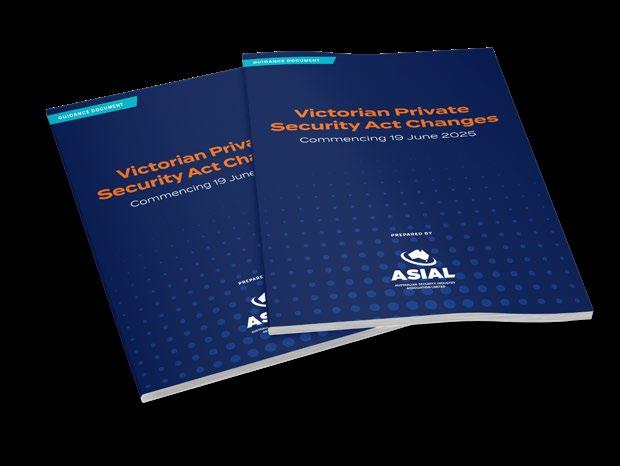
In June 2025, the Fair Work Commission announced a 3.5% increase to Award Rates of Pay.
Increases in wage rates and Allowances for Modern Awards will come into effect from the first full pay period on or after 1 July 2025.
ASIAL has prepared wage rate schedules for members with employees covered by the Security Services Industry Award 2020.
Available in the members area at asial.com.au
Please also note, superannuation contributions will also increase by 0.5% from 1 July 2025.
The ASIAL 2025 edition of the ASIAL Small Business Human Resources Handbook is now available to members free of charge.
The Handbook has been updated to reflect recent amendments to workplace relations obligations.
MORE INFO
Find it in the members area at asial.com.au


Access Canberra has advised that due to a software issue, they are currently experiencing issues with the printing of security licence cards. As a priority they are seeking to address the issue to allow usual card printing services to resume.
In the meantime, to support industry licensing for security licence holders, Access Canberra is implementing the use of paperbased security certificates and UID cards. This interim measure provides the relevant licence particulars and UID (where required) for industry licensees to either commence employment or continue working in the case of a licence renewal. It is recommended that the Public Registers are used to verify any licensing information presented with these certificates.
As soon as a solution has been implemented, we will notify members.

In meetings with the Victorian Portable Long Service Leave Authority (PLSLA) earlier this year, ASIAL raised concerns that overtime hours and overtime pay should not be included in the calculation of the levy on employers in their quarterly returns.
As a result of ASIAL’s proposal in those discussions, the PLSLA have recently announced that overtime hours and overtime pay will no longer be included in quarterly reports.
This will provide significant savings to all security businesses in Victoria. These new reporting requirements apply from the April–June 2025 quarter onwards.


Scan the QR code to read more
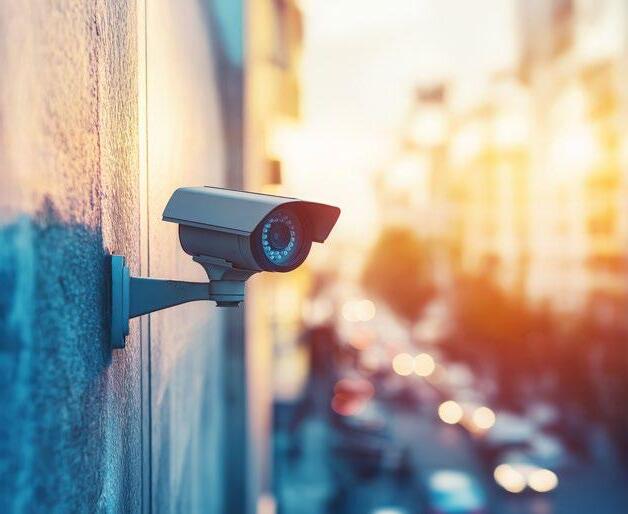
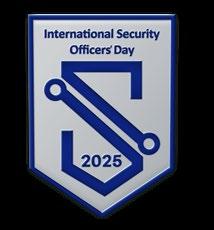





International Security Officers’ Day, which takes place on the 24th of July every year, is an opportunity to acknowledge and thank the tens of thousands of Security Officers across Australia who work 24/7 to keep us safe. In the lead up to celebrating International Security Officers’ Day, we are sharing inspiring stories of Security Officers who are making a difference on our social media channels as a way of showing the appreciation they deserve!
Why July 24th?
This date was chosen specifically to represent the 24/7 nature of security work.
How can you get involved?
Celebrating International Security Officers’ Day is simple. As an individual, you need only acknowledge any security officers you see on the day. Simply smile at that person and say thank you. It’s that simple!

If you run a security company, there are a range of things you can do:
• Send an email to your staff acknowledging the day and merely thank them for their service;
• You could organise a morning tea or make a site visit to say thank you in person;
• If you are a company that uses security staff, a simple smile and a thank you is all it takes;
• Send an email out to your staff asking them to participate by doing the same;
• Download the International Security Officers’ Day ‘Thank you’ poster for distribution around your office or via your communications channels;
• Post photos of your security officers being acknowledged to ASIAL’s or your social media channels;
• Copy the social media artwork provided and share the #thankyousecurityofficers on your social media network;
• Mention International Security Officers’ Day in a press release.


For close to 40 years, the ASIAL Security Conference has provided expert knowledge to help keep business, government and the community safe. This year’s program will bring together industry thought leaders and innovators to address the issues shaping future security threats and challenges.
ASIAL Security 2025 Conference | 27th-28th August
This year’s program features over 20 local and international security experts who will address the latest challenges, threats and opportunities.


ASIAL Gala Dinner 2025 | 28th August
The premier event on the security industry calendar provides an opportunity to network with industry colleagues from across the country.

Security Exhibition 2025 | 27th-29th August
Australia’s premier Security Industry event will showcase the latest innovations and future technologies.
Stay ahead in the fast-paced security industry with our Security Insights Webinar Series - your ultimate resource for practical advice on Workplace Relations and Compliance.
Crafted by ASIAL’s in-house team of experts, this series is designed to deepen your knowledge and provide invaluable guidance to help you navigate the complexities of workplace relations and compliance in the security sector. Tune into our 10+ webinars in the members area at asial.com.au

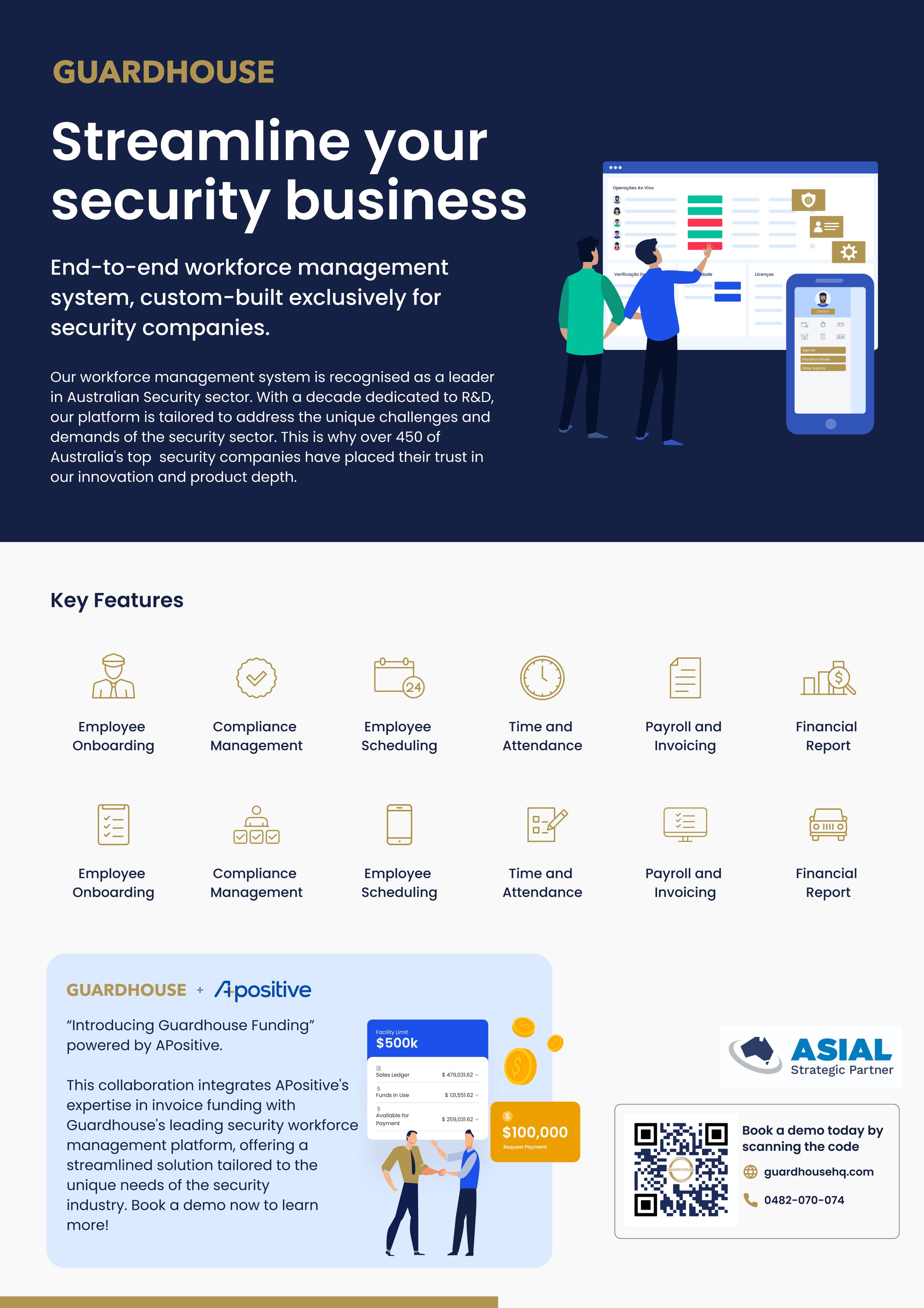
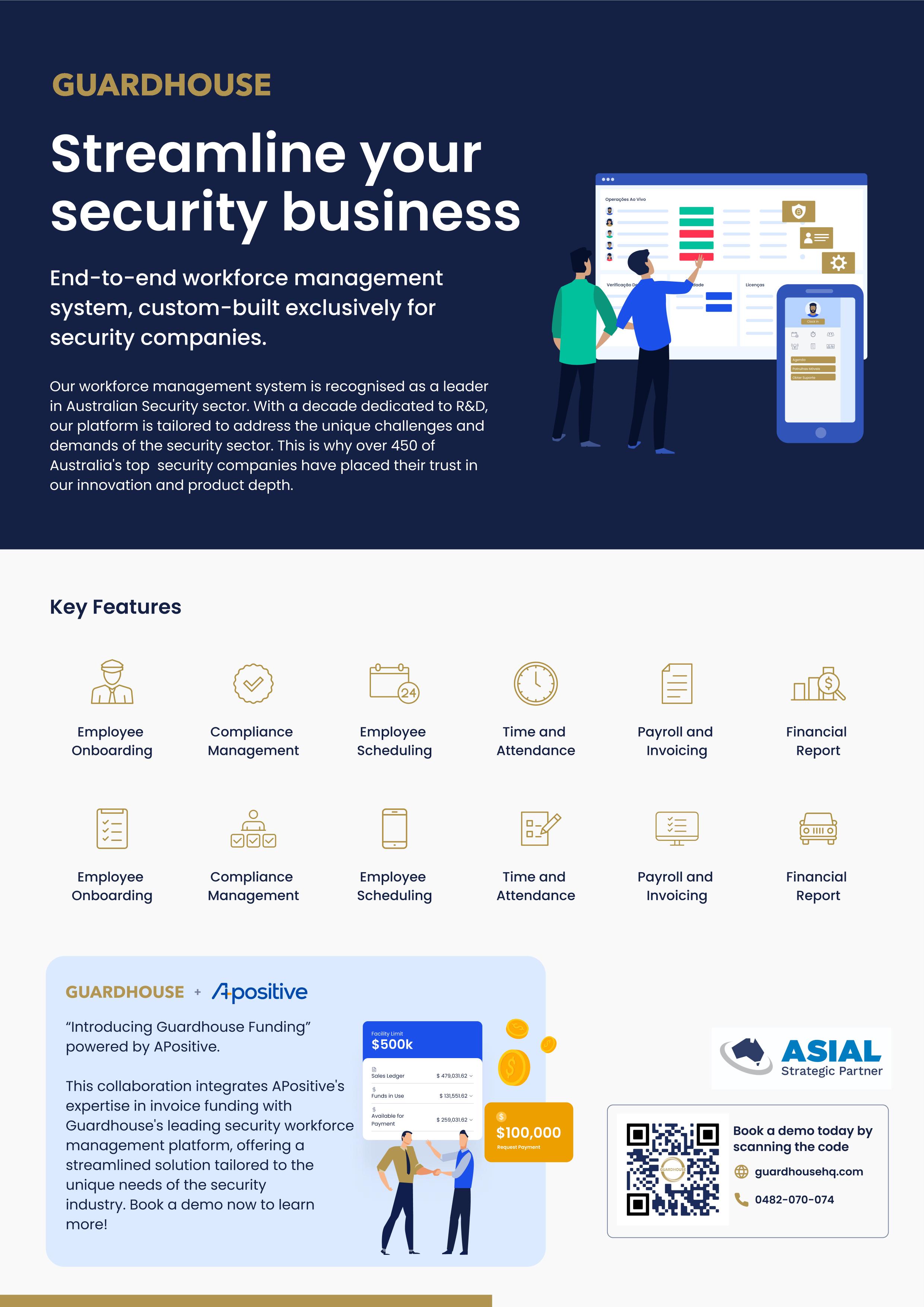
The following members were recently presented with an ASIAL Platinum membership recognition certificate (25+ years of membership).
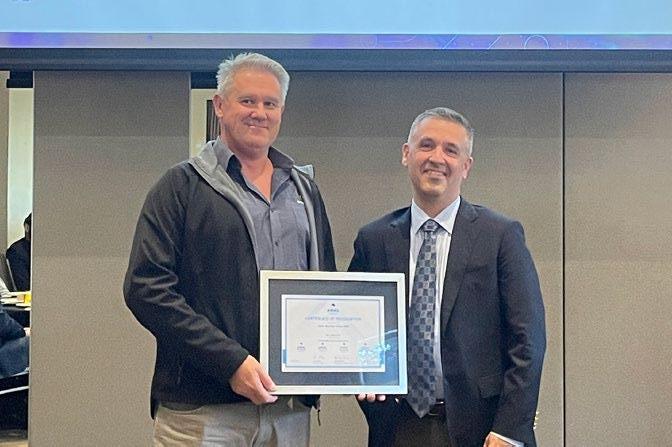
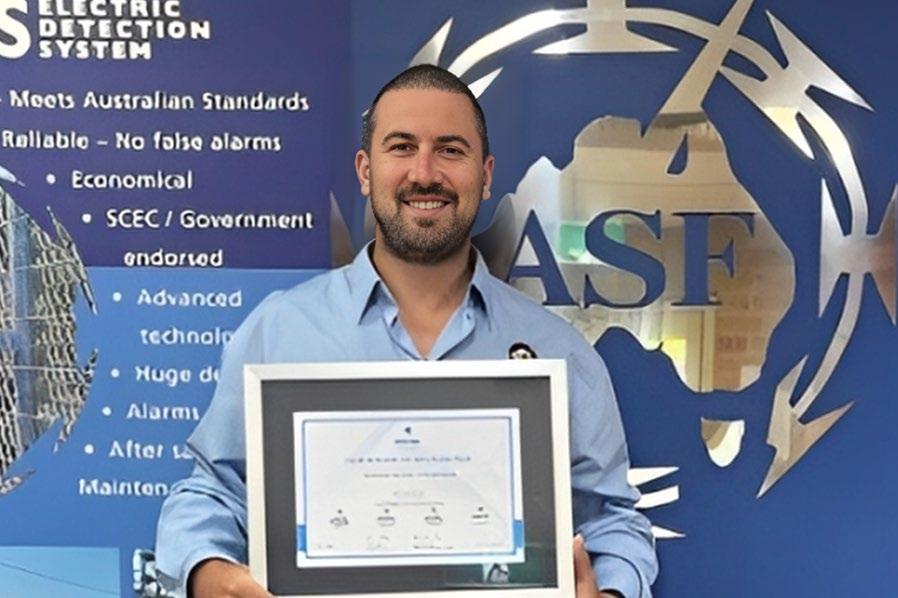
• Alec Hoffmann, NSW Operations Manager of Optic Security Group
• Paul Campkin, General Manager of Securacore Electronic Security
• Jace Rosier, General Manager of Australian Security Fencing
• Brighton Security Services
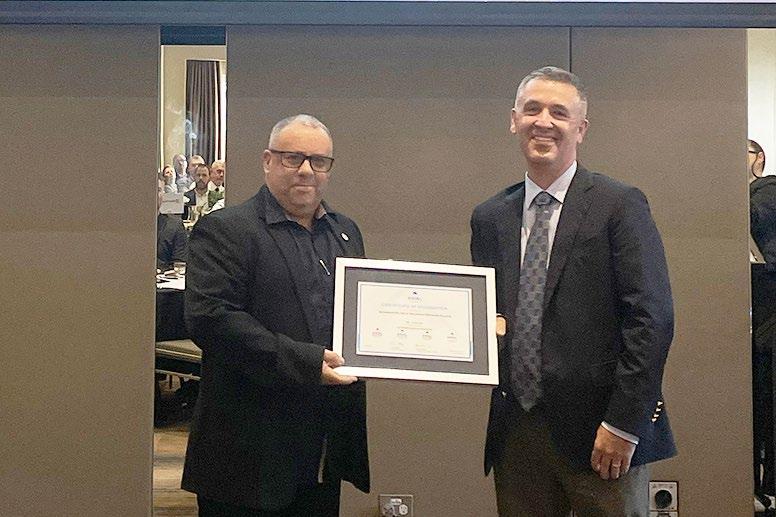
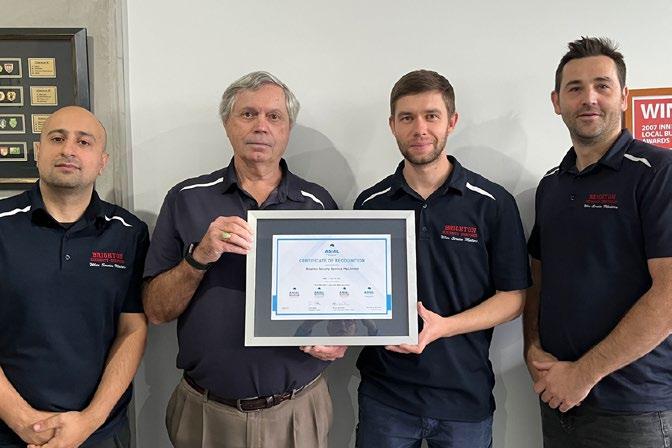
The ASIAL Individual Recognition Program (IRP) sets the benchmark for security professionals looking to progress their careers and to be recognised by employers, peers and end users.
Individuals who meet the entry criteria are eligible to receive the post-nominal credential of either MASIAL, AFASIAL or FASIAL.
Post-nominals provide a clear picture of an individual’s security experience and capability, a commitment to practice in accordance with the highest professional and ethical standards and a strong affiliation with the Association.

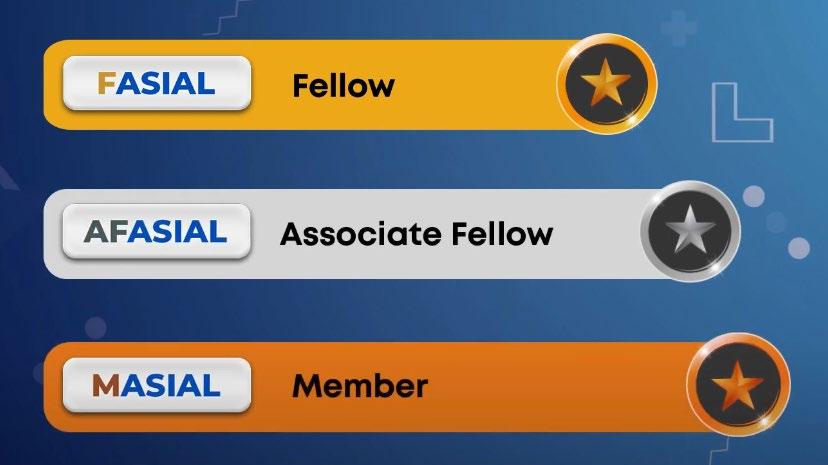





Nominations for the 2025 Australian Security Industry Awards close on 31st July 2025. Award winners will be announced at the 2025 #SecurityAwards Ceremony and Dinner in Melbourne on the 30th of October. Organised by ASIAL, the Australian Security Industry Awards features three separate awards programs:
Australian Security Industry Awards for Excellence (14 Categories)
• Diversity & Inclusion
• Individual Achievement - Technical Security
• Individual Achievement - Protective Security Services
• Product of the Year - Access Control Systems
• Product of the Year - Alarm Systems
• Product of the Year - Physical Security
• Product of the Year - Video Surveillance Systems (CCTV IP System)
• Security Equipment Manufacturer/ Distributor/Supplier
• Electronic Security Installation Over $500,000
• Electronic Security Installation Under $500,000
• Integrated Security Solution Over $500,000
• Integrated Security Solution Under $500,000
• Unsung Hero – Protective Services Sector
• Unsung Hero - Electronics Security Sector
Outstanding Security Performance Awards (9 Categories)
• Outstanding Female Security Professional
• Outstanding Contract Security Company (Guarding)
• Outstanding In-house Security Manager/Director
• Outstanding Contract Security Manager/Director
• Outstanding Security Consultant
• Outstanding Security Partnership
• Outstanding Security Team
• Outstanding Security Training Initiative
• Outstanding Young Security Professional
The Australian Security Medals Foundation Awards
• Australian Security Medal (ASM)
• Australian Security Valour Medal (ASVM)
• St John ‘Save a Life’

Elections for ASIAL Board Members are scheduled to be held this year. The election process is managed by the Australian Electoral Commission (AEC).
Further details (including the Nomination Form and Election Notice) will be made available by the AEC in due course.
Key steps in the election
• 2 July 2025 - Close of Roll
• 1 August 2025 - The AEC Publishes the Election Notice via email, and on its website
• 1 August 2025 - ASIAL publishes the Election Notice and Nomination Form on its website
• 1 August 2025 - Nominations open
• 22 August 2025 - Nominations Close at 12:00pm (noon) AEST
• 29 August 2025 - Nomination withdrawal date at 12:00pm (noon) AEST
• 29 August 2025 - Candidate Statements and Photo to be lodged by 12.00pm (noon) AEST
If a ballot is required:
• 1 October 2025 - Postal ballot opens
• 29 October 2025 - Postal ballot closes at 5.00pm AEST
Within 14 days of the close of the ballot, declaration of election result, as per regulation 140 of the Fair Work (Registered Organisations) Regulations 2009.



During the Christmas shopping period 2024, the ‘Be Kind in Retail’ campaign was launched nationwide in Australia, as an ongoing collaborative effort to combat alarming levels of abuse, violence and the use of weapons against workers. A retail industry coalition including ASIAL comprised of the Shopping Centre Council of Australia (SCCA), National Retail Association (NRA), Australian Association of Convenience Stores (AACS), Pharmacy Guild of Australia, and Building Service Contractors Association of Australia (BSCAA).
The campaign consisted of over $7 million commercial advertising value, with 3,500 digital screens, over 120 million campaign plays and engagement of over 250 million.
Feedback from campaign participants noted a reduction in recorded threatening and aggressive incidents against staff at certain locations throughout the period of the campaign year-on-year, (Nov – Dec 2023 – Nov – Dec 2024). This is a positive outcome, and further analysis and retail industry discussions will be undertaken to improve any future campaigns.

ASIAL is now on Instagram! Follow us at @asial_au for the latest security industry updates and exclusive insights. Why Follow?
• Event Highlights: Conferences, networking, and training.
• Video Content: Expert insights and member spotlights.
• Engagement: Connect with professionals and join the conversation.

After-tax contributions are extra contributions to your super you make with money you’ve already paid tax on. Also known as non-concessional contributions, these could be from your after-tax salary, savings, an inheritance or a tax refund. Making after-tax contributions can potentially reduce the tax you pay when they’re claimed as deductions.

This could also be a chance to add to your super by making catch-up contributions from previous years – a smart way to grow your balance faster if you’re able and eligible. Remember, the more you add, the better chance you have of achieving financial freedom in retirement. Here are some of the ways you could grow your super and save on tax.
Keep in mind, to be eligible to make after-tax contributions your total super balance must be less than $1.9 million on 30 June of the previous financial year.
opportunities from across the world and across different types of assets including:
Also known as concessional contributions or salary sacrifice, before-tax contributions are when you add to your super from your before-tax pay. These are in addition to the 11.5% superannuation guarantee (SG) your employer pays into your account, and any extra contributions they make. Keep in mind, the SG will increase to 12% on 1 July 2025. Making a before-tax contribution could reduce the amount of income tax you pay.
Owning listed shares means owning part of companies that are listed on a public exchange, like the Australian Stock Exchange (ASX). AustralianSuper invests in Australian and international companies.
These are contributions you make on behalf of your partner using your after-tax income. Depending on how much your partner earns, adding to their super before the end of financial year can help boost retirement savings for your partner and you could also save on tax. Also, keep in mind that you must be married or in a de facto relationship with your partner to make super contributions on their behalf. You must also both be Australian residents.
Listed shares generally make money in two ways –through an increase in the share price and when companies pay dividends.
When you make a before-tax contribution, you’re adding to your super before income tax is deducted from your pay. You can save on tax by reducing the amount of income you have to pay tax on. Super is generally taxed at 15%, so if you pay a higher rate of tax on your income, this could help you save at tax time.
Credit investments involve providing finance agreed period in exchange for a return. AustralianSuper has a specialised team that private credit opportunities directly in the and infrastructuresectors.
You can also split your before-tax contributions to your partner’s super by splitting up to 85% of your before-tax super contributions. This means some of your contributions go into your super and some goes into theirs.
Private equity involves investing in companies that are not listed on a public exchange like the ASX. AustralianSuper co-invests in private equity along with specialised private equity managers.
Fixed interest investments provide income interest payments. Fixed interest investment bonds and debt issued by governments and companies.
Scan the QR code for more info.
Infrastructure investments are assets that provide essential public services.These include bridges, roads, airports and power plants. AustralianSuper’s portfolio includes large-scale infrastructure investments in Australia and international markets

Cash investments are short-term money market instruments. These are issued by banks, like NAB and Westpac, governments and companies
1. Before adding to your super, consider your financial circumstances, eligibility, contribution caps that may apply, tax issues and when your super can be accessed. We recommend you consider seeking financial advice. Sponsored by AustralianSuper Pty Ltd, ABN 94 006 457 987, AFSL 233788, Trustee of AustralianSuper ABN 65 714 394 898. Any general advice provided in this article is provided under the AFSL held by AustralianSuper, it does not take into account your personal objectives, financial situation or needs. Before making a decision, consider if the information is right for you and refer to the relevant Product Disclosure Statement, available at australiansuper.com/PDS or by calling 1300 300 273. A Target Market Determination (TMD) is a document that outlines the target market a product has been designed for. Find the TMDs at australiansuper.com/TMD
AustralianSuper has investments throughout world. This helps support Australia’s economy members benefit from growth in local and international markets. Importantly, this global approach can help reduce investment risk through diversification.

On 19 June 2025, most changes under the Private Security and County Court Amendment Act 2024 (the Act) came into place.

This means all private security activities will become licensed activities, and there will be some additional requirements for existing licence holders.
The changes introduced by the Act include:
• private security registration holders are required to transition to licences to continue working in the security industry
• additional requirements before private security licences can be renewed
• independent contractors with an Australian Business Number (ABN) related to their security activity are required to hold both a:
- Private Security Individual Operator licence, and
- Private Security Business licence
• an expanded process for complaints.
To provide assistance in interpreting how it is considered the legislative changes will apply and operate, ASIAL has prepared a guidance document. The document includes additional comments are made where amendments are impacted by pending LRD decisions, or further legislative interpretation.

Scan the QR code for more info about the ASIAL Guidance document, along with other resources about the Victorian regulatory change.
The information provided does not reflect the verbatim, words of the amending legislation. It should be noted that the information provided is not nor intended to be legal advice, it is provided as general guidance information for discussion, education and comment. Members seeking specific advice for their organisation should obtain professional advice.

Scan the QR code to view the full amending act

Scan the QR code to view amending legislation
The Licensing and Regulation Division, Victoria Police continues to publish information relating to the amending legislation and their associated processes to support the introduction of the changes at: police.vic.gov.au/changes-private-security-licence s-and-registrations.
Registrations due to expire between 19 June 2025 and 19 June 2026
If you hold a private security registration due to expire on or after 19 June 2025, you will need to apply for:
• a Private Security Individual Operator licence, or
• a Private Security Business licence, or
• both.
You will need to do this before your registration expires.

Among the key amendments include:
• Introduction of a single licensing system
Business Registrations will cease, with additional requirements required for business registrations transferring to a licence (relating primarily to probity, including fingerprinting and criminal history checks).
• Requirement for Independent contractors to hold a Private Security Business Licence
Individual licence or registration holders working as an independent contractor on a personal ABN as a business, will now be required to also hold a Private Security Business Licence.
• New definitions for private security activities
There will no longer be class A or class B activities.
Private security activity will be defined as:
- acting as an investigator
- acting as a bodyguard
- acting as a crowd controller
- acting as a security guard
- acting as a private security trainer
- acting as a security equipment installer
- acting as a security adviser.
• Subcontracting becomes a compliance issue requiring client consent, communication, advice, and record keeping.
Registrations due to expire on or after 19 June 2026
If your private security registration is due to expire after 19 June 2026, you will need to apply for:
• a Private Security Individual Operator licence, or
• a Private Security Business licence, or
• both.
You will need to do this before 19 June 2026.
The Licensing and Regulation Division (LRD) will notify you by email when it is time to start the licence application process. If there are any changes to your contact details, you must submit a change of details form. The transition to licences must be completed by 19 June 2026.
You will also need to have a full set of fingerprints taken for your application.
All endorsed security activities must be listed on the relevant licence or licences. If you hold both a current private security licence and a registration, you can apply to vary your licence and add the security activities from your registration. Visit apply for a new private security licence: police.vic.gov.au/ applying-new-individual-licence-or-registration
• Introduction of a Code of Conduct.
• Requirement for a risk management plan to be provided for security activities with significant responsibility being placed on the client.
• Refresher training for individual licence holders
Introduction of refresher training for security officers, crowd controllers and bodyguards when they renew their licence.
• Easing of some application processes
Including removal of referee requirements and a

Independent contractors and sole traders with an ABN
An independent contractor who carries on a security activity and has an ABN which relates to that activity, must hold both a:
1. Private Security Business licence, and 2. Private Security Individual Operator licence.
This is under section 14 of the Private Security and Country Court Act 2024 (section 15A in the Private Security Act 2004 from 19 June 2025).
This requirement aims to stop sham contracts, and works together with Commonwealth and state laws.
The requirement to hold both a Business and an Individual Operator licence will come into place by December 2025.
Both licence applications can use the same set of fingerprints, as long as the fingerprints were taken within six months of when you submit your application. If you have previously had your fingerprints taken for a private security licence, and held and maintained the licence since then, you can use these fingerprints for your new application.

By John Fleming General Manager, ASIAL
The Australian Signals Directorate (ASD) has developed prioritised mitigation strategies to help organisations protect themselves against various cyber threats. The most effective of these mitigation strategies are the Essential Eight which has been designed to protect organisations’ internet-connected information technology networks.
Over the past 18 months, using a risk-based approach, ASIAL has undertaken a review of its own IT infrastructure to implement measures to meet Essential 8 Maturity level One. The Essential Eight has defined four maturity levels, (Maturity Level Zero through to Maturity Level Three). Except for Maturity Level Zero, the maturity levels are based on mitigating increasing levels of tradecraft (i.e. tools, tactics, techniques and procedures) and targeting.
LEVEL ONE MATURITY
At this level, the focus is on stopping attackers who use basic, common tools and tricks to break into systems. These attackers don’t usually target one specific person or company. Instead, they look for easy ways in, like using a known bug in a system that hasn’t been fixed yet or logging in with stolen or guessed passwords.
They try to find any system with weak spots. They also use simple tricks, like fake emails, to fool people into helping them get in. If they get into an account with special access, they will use that to cause more harm. Sometimes, they may even delete important data and backups.
LEVEL TWO MATURITY
At this level, the attackers are a bit more skilled and determined than in Level One. They are willing to spend more time and effort to break into systems. They improve their tools to make them harder to detect and better at getting past security.
These attackers may send fake messages (phishing) to trick people into giving up their passwords. They also try to get around weak two-step login systems (multi-factor authentication) using both technical tricks and by fooling people.
LEVEL THREE MATURITY
At this level, attackers are more advanced and flexible. They don’t just use common tools — they often make their own or change existing ones to avoid being caught. They look for weak spots like old software or poor system monitoring to sneak in, stay hidden, and move around inside.
These attackers often go after specific targets and are willing to spend time and effort to get past strong security. For example, they might trick someone into opening a dangerous file and also helping (without knowing) to get past security rules. They may even get around strong twostep logins by stealing codes or tokens to pretend to be someone else.

Once inside, they try to get more powerful access, move to other parts of the system, and hide what they’ve done. They may even delete everything, including backups. Our experience in working towards implementation of Essential Eight Maturity Level One (from the Australian Cyber Security Centre (ACSC) offer a number of key lessons for organisations, especially those at the start of their cyber
1. Security is a journey, not a Destination
Lesson: Maturity Level One isn’t the end goal—it’s the foundation.
Implementing Level One reveals how complex systems and processes can be, even at a basic level. It highlights gaps and helps organisations build a roadmap for higher levels. Level One of the Essential Eight is designed to protect against basic, high-volume cyber threats like ransomware, phishing, and malware. These are the most common types of attacks and can have a huge impact, especially on businesses with limited cyber maturity.
2. No One Size Fits All
Lesson: Customisation is often necessary.
Organisations learn that even prescriptive guidance like the Essential Eight needs to be interpreted in the context of their environment—what works for one department or system may not work for another. The Australian Cyber Security Centre (ACSC) developed the Essential Eight as part of its baseline security guidance. Implementing it shows that your company is serious about cybersecurity, which can also:
• Boost your reputation
• Help with government or enterprise contracts
• Align with compliance requirements
3. Asset Visibility is Crucial
Lesson: You can’t protect what you don’t know.
Level One implementation exposes how incomplete or outdated inventories of systems, applications, and users can hinder basic controls like application whitelisting or patching. Level One doesn’t require heavy investment in advanced tools or complex processes. It focuses on basic, manageable actions that give a solid return on investment in terms of risk reduction—ideal for small to mid-sized businesses or those early in their cyber journey.
3. Patch Management is More Complex Than Expected
Lesson: Timely patching is difficult without strong IT processes.
Even with automated tools, discovering, testing, and deploying patches within recommended timeframes reveals challenges in coordination between IT and business units.
4. User Awareness and Behaviour is a Risk Factor
Lesson: Technology alone isn’t enough.
Multi-factor authentication and macro controls show how much users influence risk. Training and change
security uplift. These lessons span technical, strategic, and cultural areas.
By undertaking a review of your IT infrastructure, you can gain greater clarity, control, and confidence of your cyber risk exposure, enabling you to make informed security decisions and strengthen business resilience.
management become essential. Clients, suppliers, and partners want to know their data is safe. By implementing Maturity Level One, you’re signalling that you take cyber seriously—an increasingly important factor in business relationships.
5. Foundational IT Hygiene is Often Weak
Lesson: Basic IT practices need strengthening.
Organisations often uncover poor practices like shared admin accounts, lack of documentation, weak access controls, or inconsistent backup procedures. It gets your organisation into good habits and builds capability.
6. Cross-Functional Collaboration is Needed
Lesson: Cyber security isn’t just IT’s problem.
Implementing controls, like restricting admin privileges or MFA restricting attackers from logging in with stolen passwords. This involves HR, legal, finance, procurement, and others—pushing organisations toward stronger governance and cooperation.
7. Risk-Based Decision Making Emerges
Lesson: Not everything can be fixed at once. Organisations begin to prioritise controls and assets based on risk, leading to better investment and effort alignment. Regular backups of data let you recover from ransomware or data loss, they should be daily, tested regularly and stored offline or securely in the cloud.
Strengthening Our Cyber ResilienceImplementing the Essential Eight
Completing implementation of Essential Eight cybersecurity strategies to Maturity level One has truly been a team effort.
This journey was more than just technical uplift, it is about creating a strong security culture within the organisation. Our staff embraced new practices and ways of doing things, adapted quickly, and contributed towards building a more resilient, secure environment for our customers.
From multi-factor authentication to patch management, application controls to user awareness, every layer of the Essential Eight contributed to us building a stronger, more resilient foundation.
Bringing staff along for the journey was key to making security part of our everyday operational mindset.
Cybersecurity is an ongoing commitment, and we will continue to evolve our practices as threats change.
27-29

Witness the future of security at the Security Exhibition & Conference 2025
Step into a world where AI-powered surveillance detects threats before they emerge. Experience unhackable, frictionless biometrics and cyber platforms that anticipate attacks through behavioural patterns.
For over three decades, the Security Exhibition & Conference has been the industry’s beacon of innovation.
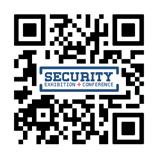
Now, it returns with groundbreaking solutions that seamlessly integrate physical and digital security ecosystems.
Secure your spot now to shape the future of security this 27-29 August at the ICC Sydney.
HEADLINE SPONSOR IN PARTNERSHIP WITH
IN PARTNERSHIP WITH
Discover the future of security at the Security ASIAL Conference 2025, where the world’s foremost leaders, policymakers, and innovators unite to tackle the most urgent threats facing our industry.
This year’s program goes beyond the headlines, delivering critical insights on the shifting international order, AI-driven risks, cyber warfare, and the vulnerabilities of critical infrastructure, all while emphasising the essential human element in security strategy.
Join this exclusive gathering curated by the industry’s peak body, where you’ll gain direct access to the organisations and experts actively shaping the security landscape. Through dynamic

KEYNOTE SPEAKER
Peter Jennings AO PSM Director of Strategic Analysis Australia, Peter Jennings Strategy Consultants

Scott O’Driscoll National Security Manager, ABC

Paul Magee CEO, Auraya

Amanda Spencer Director, Solutions Engineering, Cloudfare
sessions and real-world case studies, you’ll discover actionable strategies to anticipate threats, mitigate risks, and safeguard your assets in a world defined by uncertainty.
Stay ahead of the curve, sharpen your expertise, expand your professional network, and leave with a competitive edge through proven approaches tailored for today’s rapidly evolving environment.
Don’t miss this opportunity to be at the forefront of security innovation and drive your organisation’s resilience into the future.
Use code SEC10OFFASIAL at checkout to receive 10% off full priced tickets.

Assam Victor-Ifeanyi Security Operations Engineer, Health Sector

Hamish Hansford Deputy Secretary – Cyber and Infrastructure Security, Department of Home Affairs

Shane Brady Associate Director, Strategic Security Unit, Premier’s Department NSW

Anna Acopian Founder & CEO, SafegateAI

27-29 August ICC Sydney | Free Registration
For almost four decades, the Security Exhibition & Conference has been the industry’s beacon of innovation. Now, it returns with groundbreaking solutions that seamlessly integrate physical and digital security ecosystems.
Step into a world where AI-powered surveillance detects threats before they emerge. Experience unhackable, frictionless biometrics and cyber platforms that anticipate attacks through behavioural patterns.
Discover the latest security solutions from Wesco Anixter, Assa Abloy, Convergint, AXIS Communications, plus hundreds more, all in one place at Australia’s largest security industry trade event. With hundreds of new products on display, some will be launching in Australia for the first time.
Secure your spot now to shape the future of security this 27 - 29 August at the ICC Sydney. Registration for the exhibition is FREE, complete it now to save time on site.

27-28 August ICC Sydney | Tickets available
The Security ASIAL Conference 2025 is where the industry’s foremost leaders, policymakers, and innovators unite to tackle the most urgent threats facing our industry and dissect the theme Security at a Crossroads. This year’s program goes beyond the headlines, delivering critical insights on the shifting international order, AI-driven risks, cyber warfare, and the vulnerabilities of critical infrastructure, all while emphasising the essential human element in security strategy.
Join this exclusive gathering curated by the industry’s peak body, where you’ll gain direct access to the organisations and experts actively shaping the security landscape. Through dynamic sessions and real-world case studies, you’ll discover actionable strategies to anticipate threats, mitigate risks, and safeguard your assets in a world defined by uncertainty.
Stay ahead of the curve, sharpen your expertise, expand your professional network, and leave with a competitive edge through proven approaches tailored for today’s rapidly evolving environment.
Don’t miss this opportunity to be at the forefront of security innovation and drive your organisation’s resilience into the future.
As a special offer to Security Insider readers use the code SEC10OFFASIAL to get 10% off at the checkout when securing your tickets.
28 August ICC Sydney Parkside Ballroom
Tickets available
This ultimate networking evening, hosted in partnership with ASIAL, will bring together security professionals from across the globe to celebrate, engage and socialise with colleagues, suppliers, and clients – old and new.
Guests will enjoy a lively atmosphere as they continue vital business conversations into the evening. Incorporating fine wine, three-courses and live entertainment (from MC Brian Nankervis), the evening will also recognise the Best New Product Awards.



Register your tickets and find out more at securityexpo.com.au/whats-on/conference
Day 1 | 27 August 2025


AI-generated Deep Fake and Synthetic attacks
Paul Magee Auraya, CEO
A Collaborative Approach to Security
Dominic Olliff
Brisbane 2032 Olympic and Paralympic Games Committee, Director of Venues
PANEL: Fostering a Strong and Collaborative Security Culture in a Changing Security Environment



Scott O’Driscoll ABC, National Security Manager
Assessing and Responding to a Changing Security Environment
Chief Inspector Colin Green
NSW Police Force, Manager, Terrorism Protections Unit, Counter Terrorism and Special Tactics
Zero-Trust for Physical Access: Moving Beyond Keys and Credentials
Michael Stuer portier, CEO
Day 2 | 28 August 2025



Risks, Security and Regulations for AI/Machine Learning
Colin Renouf Healius, Chief Information Security Officer
A Different Angle to Improve Operational Readiness through Table Top Exercise
Dian Erliasari Telstra, Senior Information Security Manager
Advanced Threat Intelligence and Cyber Security Strategies
Siddharth Rajanna Bingo Industries, Head of Cyber Security
PANEL: The Rise of AI: Trends, Challenges and Leading Ahead



Anna Acopian SafegateAI, Founder & CEO
Stephen Kowal Atturra, CEO


Tanya Kunze
Swift Global Consulting, Neuroscience Coach
Lee Hicken
National AI Centre, Australian Government, Executive Director
When Doors Lie: Real-World Cyber-Physical Breaches & How to Stop Them
John Kouroutzoglou
Secure Tactix, Founder / Cybersecurity & GRC Consultant






KEYNOTE: Security in a Multipolar World
Peter Jennings AO PSM
Peter Jennings Strategy Consultants, Director of Strategic Analysis Australia
SOCI Act Compliance and Assurance, Lessons Learnt
Jonathan Howe
Beca Applied Technologies, Business Director, Security and Risk, Facility Security Officer
Hannah Mason
Sydney Opera House, Director, Production, Events & Security
Shane Brady Premier’s Department NSW, Associate Director, Strategic Security Unit
From Complexity to Clarity - Strategies for Effective Stakeholder Engagement
Assam Victor-Ifeanyi Health Sector, Security Operations Engineer
Insider Threats and Intention Discernment: A Cognitive Approach to Security
Victor C. Okoro University of Otago, Doctoral Researcher




Advancing Protective Security Settings for the Protection of All Hamish Hansford Department of Home Affairs, Deputy Secretary - Cyber and Infrastructure Security
A Data-Driven Approach to Security and Safety Process Optimisation Using Intelligence at the Edge
Ollencio D’Souza Technologycare, Managing Director
The Double-Edged Sword of Supply Chain Security
Henry Ward Orro Group, Lead Consultant
Leadership in the Modern Era
Cathy Dimarchos
Solutions2You, Founder & CEO


Sink or Sync: Cybersecurity Strategies to Connect, Protect and Build
Amanda Spencer Cloudflare, Director, Solutions Engineering
Security and the safety of other people’s property is your business. Protecting your business is equally important.
AON has over thirty five (35) years’ experience working with the Security Industry and has designed specific insurance cover that aims to meet the needs of security businesses. We have an in-depth knowledge of the risks associated and the insurance programs required to help reduce your exposure.
Designed specifically for security organisations and Approved by the Australian Security Industry Association
APRA (Australian Prudential Regulation Authority) authorised insurer – Liberty International Underwriters.
Tailored Business Activity to capture your risk associated to your unique security activities
Financial Loss Liability (Errors & Omissions) is Automatically included up to $2,000,000
Loss of Keys Cover Automatically included up to $500,000
Loss of Money Cover Automatically included up to $100,000
The difference is clear, speak to Michael Pham your AON Relationship Manager for ASIAL Members for an obligation free quote and get the peace of mind you deserve.
Cover for the use of guns and dogs automatically included
$1,000 excess for crowd control/assault claims, our competitors impose a $5,000 excess for claims of this nature
No injury to contractors/sub-contractors excess, otherwise known as worker to worker excess, our competitors impose a $25,000 excess for claims of this nature
Civil Liability Professional Indemnity included as an optional extension
Statutory Fines & Penalties included as an optional extension
Cover for Cash in Transit / Cash in Safe optional extension

Michael Pham AON Security Client Manager 02 9253 7326 | michael.pham@aon.com

By John Fleming General Manager, ASIAL
Retail crime in Australia is a significant and growing problem, impacting businesses and communities. It is estimated that retail crime costs Australian businesses $9 billion annually. There is also strong evidence that shows a substantial increase in violent and threatening incidents (up 66% year on year), as well as crimes involving weapons, particularly knives and blades, which has led to growing concerns about the safety of retail workers and customers.

Q: What are the core elements of a comprehensive, grocery retail security store strategy ie what are three technology components retailers should focus on in 2025?
1. AI-Powered Video Surveillance & Analytics
The use of smart cameras with AI to monitor behaviour, detect suspicious activities (e.g, loitering, shelf-sweeping, aggression) and trigger real-time alerts can provide a highly effective tool to proactively reduce crime. Rather than just recording crime AI video surveillance and analytics offers an effective means of preventing crime. There are a range of different applications that can be implemented, including the use of facial recognition, anomaly detection, automated incident reporting, people counting and queue monitoring.
2. Smart Access Control & EAS (Electronic Article Surveillance) Systems
Access Control systems offer a means of managing who can access sensitive areas such as storerooms, loading docks and operational areas. Organised retail crime groups often target backrooms and supply chain areas. Security RFID tags provide an effective way of protecting highvalue stock with discreet tags and exit alarms, which can be integrated with video surveillance feeds for incident validation.
3. Unified Incident Management & Threat Intelligence Platforms
By centralising the reporting of theft, fraud, violence, and other incidents into a real-time, cloud-based dashboard, grocery store operators can identify threats and trends, (for example spotting serial offenders across stores) in a timely manner. This, in conjunction with the use of mobile reporting apps for employees, AI threat analysis, cross-store pattern recognition, and link analysis between incidents; enables a faster and more coordinated response for dealing with offenders.
Q: How has grocery retail crime evolved over the past decade? What trends are impacting crime in the grocery retail space?
The rise in Organised Retail Crime (ORC) rings targeting grocery stores for specific items (such as baby formula, beauty products, tobacco and meat), which have a high resale value online or on the black market, is a growing challenge for store operators. These groups are well-coordinated, often hitting up multiple locations and using insiders or stolen vehicles. Added to this, it is also important to note that employee theft has become more sophisticated, often involving refund fraud or collusion with external actors.


Over recent years, customer aggression and/or violent interactions, including assaults on staff or verbal abuse instore and at checkouts, has become more and more prevalent. This has prompted stores to put in place de-escalation policies, such as avoiding physical confrontations and to engage licensed security personnel. The use of Personal Protective Equipment (PPE) for security guards in retail settings is increasing, particularly with the adoption of stab vests and body-worn cameras. These tools not only offer protection but also serve as a deterrent to offenders by capturing direct evidence of incidents. In some cases, retail staff are also being equipped with body-worn cameras.
Inflation, homelessness, and supply-chain instability have led to more desperate thefts, including necessity-based stealing. These pressures can spike local crime around grocery stores, particularly in urban and high-poverty areas. In addition to this, grocery retail crime has evolved from casual shoplifting to organised, high-tech, and often confrontational threats. What this means in the current environment, is that grocery retailers need to utilise smart technologies, improved training and a community-sensitive approach to achieve more targeted and effective crime prevention.
Q: How is AI impacting instore security?
Store personnel play an important role in preventing theft in retail establishments, as a result it is crucial that you equip staff with the appropriate knowledge in engaging with customers, detecting suspicious behaviour and how to respond.
• Real-Time Threat Detection - AI-powered video analytics provide an increasingly effective way of detecting suspicious behaviours like loitering, shelf-sweeping, aggressive movements, or frequent return patterns. Alerts are triggered instantly, enabling staff, security or a police responseoften before a crime fully unfolds.
• Intelligent Video Surveillance - cameras are now using machine learning to recognise patterns of behaviour, such as theft methods and customer flow anomalies. Through the use of AI, surveillance systems can filter out false positives (like staff restocking) to prioritise genuine threats. Systems are becoming increasingly sophisticated, allowing for the tracking of repeat offenders across locations using clothing, gait or license plate recognition.
• Self-Checkout Theft Prevention - AI monitors at self-checkout stations provide an efficient means of identifying non-scans, barcode switching, fraud (scanning expensive items as cheap produce). Systems now provide a means of visually verifying that scanned items match what’s in a shopper’s bag. AI brings speed, accuracy, and foresight to in-store security - helping prevent theft and violence while improving customer and staff safety.
Q: What is the major change you predict we’ll see in the grocery retail space in the near term? What technology or technologies will have the greatest impact?
The major change coming soon to grocery retail is a full convergence of security, operations, and customer experience. What this means is that the same technologies used to prevent crime will also be able to enhance shopping convenience and store efficiency. Security will no longer be siloed, it will become an integral part of the everyday store flow.
Q: What advice would you offer a grocery retailer exploring whether to invest in or upgrade their instore security? Where should they start?
Start with a comprehensive security risk assessment.
Before committing expenditure to purchase new technologies and solutions, undertake an audit of your current vulnerabilities. What types of theft or incidents are most common (Organised Retail Crime, internal theft, self-checkout fraud)? Which locations or departments are at the highest risk (e.g., alcohol, meat, pharmacy)?
Engage a licensed security professional and make sure they are an ASIAL member. Assumptions can be very costly, so it is important to do your due diligence with any potential provider.
Develop a strong culture of security awareness among all staff, not just security staff. Just as technology is vital to reducing crime, engaged and well-trained employees can be your first and most effective line of defence. So, build on this by investing in training for your staff on loss prevention and de-escalation skills, and ensure you have clear communication and reporting channels.
Store personnel play an important role in preventing theft in retail establishments, as a result it is crucial that you equip staff with the appropriate knowledge in engaging with customers, detecting suspicious behaviour and how to respond. Make sure they are aware of common shoplifting methods by staying alert around cash registers and monitoring dressing rooms. Also, provide staff with training in crowd management - especially during peak periods – so they are aware of standard operating procedures covering a range of different scenarios, so if an incident does arise, they know how to respond.
Hand-in-hand with this is to ensure you have effective communication in your retail setting, this not only enhances customer experience, but in turn it can serve as a strong deterrent to theft.
First published in Retail World magazine.








International Security Officers’ Day held on the 24th July each year is a day to thank and acknowledge the incredible work Security Officers do in keeping us safe. They often go unnoticed, yet these quiet achievers do us a great service and it is important we show our gratitude.
This International Security Officers’ Day we would like to thank all Security Officers.

Thank you
Muhammad Ahmad Ali
Pro-Guard Security Group
As NSW State Operations Manager at Pro-Guard Security Group, Muhammad oversees security across hospitals, transport hubs, shopping centres, and government sites throughout New South Wales— including remote areas like Broken Hill. He ensures top-tier safety standards while fostering strong client relationships and mentoring frontline officers to maintain consistent, reliable service.

Thank you Roger Richards
Great Southern Security
Roger Richards is an important part of the Great Southern Security team, with over 15 years of experience, leadership and strong local cultural knowledge. A proud Ramindjeri and Ngarrindjeri man, he leads by example and brings a deep connection to Country and community. His dedication to safety, reliability, and professionalism makes him a trusted figure among both clients and colleagues. Roger has calm presence, problem-solving skills, and unwavering commitment to doing the job right.






Thank you Kirandeep
MA Services Group
Kirandeep has worked at Southern Cross Station for the past two years. Currently Kirandeep is a control room operator. She is renowned for her customer centric approach and willingness to help others in her demanding role.
Thank you George Wilson
Glad Group Services
George has been doing security for approximately 20 years and enjoys the challenges of the job. Interacting with the public and helping people are highlights for George.


Thank you George Sleiman
Chief Group Services
George is a dedicated and professional team member, known for his calm presence and commitment to safety. He takes pride in creating secure, risk-free environments and thrives on the responsibility his role brings. As a supervisor, his strong work ethic and leadership earn him trust and respect across the team.
Thank you Shane Lee
Labourplus Security
Shane is a dedicated leader at Labourplus Security in WA and a valued representative of Ace Security & Event Services. He consistently demonstrates exceptional leadership professionalism and dedication to every client, approaching even the most challenging tasks with confidence and competence. He has commitment in every aspect of his role and sets a high standard in everything he does..

Thank you Ladrin Elieh
Securecorp
Ladrin is a valued team member and has been at Collins Square for many years. She shows pride in her work and more importantly shows passion for her role as well as the Security industry, like many she enjoys the interaction she has with others and being able to help.
Thank you Lesley
Wilson Security
Lesley provides exceptional customer service in an environment where students, staff, and customers feel safe and secure. She enjoys resolving conflicts in challenging situations and feels valued contributing her services back to the community.


Thank you Rita Hanna
Mantr Group
Rita brings punctuality, professionalism, and warmth to every shift. Her commitment to meeting client needs and approachable nature has earned her consistent positive feedback. A team player who is both reliable and kind-hearted, Rita exemplifies the values of integrity and service that make the security industry proud.
Thank you Suman EXEC Security
Suman is a standout Security Officer known for her positive attitude and exceptional customer service. She combines strong security awareness with a friendly, service-first approach, making her a valued member of the EXEC Security team and a favourite among clients.
you
They have been working in the flood affected areas on a site that provides emergency temp housing for people who lost their homes. It was in the path of the storm when the cyclone struck QLD and the Reddawn crew remained on site with residents who did not evacuate when evacuation orders were issued by emergency services.
the 2025

Claudia started working in the security industry at the beginning of 2023, as part of nbn’s graduate program, which is an 18 month program. As of August 2024, she rolled on to become a full-time analyst in the cybersecurity space.
During her third year of Computer Science, she considered cybersecurity job opportunities post-graduation. She joined the 18-month nbn graduate program, exploring different areas of security through three 6-month rotations. She started in network engineering, which provided a strong foundation in network security, before moving to the Forensics and Threat Intelligence team for 12 months. There, she engaged in digital and physical investigations and cyber threat intelligence, discovering a passion for the reactive and proactive nature of the work. Now, she remains in the Forensics and Threat Intelligence team, focussing on providing insights to enhance our defenses against the evolving cyber landscape.
Claudia completed a Bachelor of Computer Science at Swinburne University, majoring in Cybersecurity, with a minor in animation. She also completed an advanced-level training program Certified Recorded Future Analyst (Threat Intelligence tool).
Claudia has always been passionate about her role and has a hard-working, dedicated attitude. She is inspired by others’ passion for security around her, which motivates her to want to express her passion to others who are considering or just starting out in the industry. She has always approached things with the mindset to absorb as much knowledge as possible from those around her, especially now at the beginning of her career, as everyone has had a different walk and journey they have taken to get to where they are now. Through this, she has gained the confidence to brief senior audiences and lead large investigations as part of her daily duties.
Claudia faces daily challenges in cybersecurity. Tackling cyber incidents are unpredictable and take more moving pieces than what it may look like from the outside. It’s easy to have tunnel vision on an incident and miss overall remediation steps, which can involve other aspects like physical security. What she has learnt, that is vital to the process, is teamwork and clear communication, ensuring all parts work together to resolve incidents effectively.
What does it mean to win the Awards?
To me, winning both the Australian and Global award shows my commitment and dedication to my passion, which I hope to keep expressing through my career. I am truly humbled to receive these awards, among others in the industry who work incredibly hard and not only inspire me to keep learning and aiming high, but others also.
What do you enjoy about working in the security industry?
What I love, is that there is never a dull day in the world of cybersecurity. There is always something new that we come across, giving more opportunities to learn and develop. As quickly as the ‘blue team’ side learns how to defend, threat actors and the ‘red team’ match - if not outgrow - the defenses at a rapid pace, meaning there’s constantly new techniques and strategies we can use to understand and improve to better protect our organisation.
What would you say to someone considering a role in the security industry?
I would say to go for it! I put a lot of emphasis on how amazing cyber is, but truly, the security industry is much more than that. Cyber assists so many other functions of security, physical to governance and risk, with many different functions within. It all comes down to a passion for problem solving and protecting people, which I have found is such a big driver of the industry. Do not hesitate to reach out to people who are in areas of security you are interested in, having the initiative to put yourself out there and express your passion will enable you to explore what you want to pursue long term.
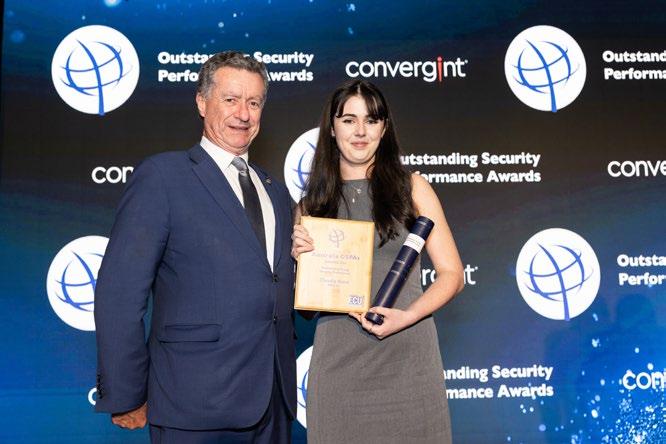

Winner of the 2024 Outstanding In-house Security Manager/Director OSPA and Best Professional Technical Specialist – Globally, Bechtel, Maksym Szewczuk, Security and Risk Management Specialist, Bechtel Corporation. Security Careers Case Study
Maksym Szewczuk, is currently the Project Risk Manager since mid-2024 and prior, Safety and Security Design Manager, for Bechtel Australia where he has been for the last five years.
He has worked in the security industry for about 17 years since he started as a graduate security advisor for Aurecon. How time flies when you’re having fun!
He had considered working in a security field throughout high school but had no notion of the different pathways or roles into the industry. Having completed an undergraduate degree, he went to work for the Department of Defence as a civilian as a starting point. He then moved into a dedicated security role at Aurecon (then Connel Wagner) as a graduate security consultant, where he worked extensively on rail security. This experience led to a role as Security Design Manager for Ausgrid, the NSW state power distributor. He took a year off to travel and then worked in security solutions for a high security products company before landing a role as safety and security design manager for Bechtel, working as a delivery partner on the new Western Sydney International Airport.
Maksym holds a Bachelor of Arts and a Master of Policing, Intelligence and Counter-Terrorism, both from Macquarie University. He also has a Graduate Certificate in Business Management from UTS. Regarding security trade qualifications, he holds a CertIV in Security Risk Management and several security certifications (CPP and PSP) from ASIS International and a Certified Nuclear Security Professional (CNSP) from WINS.
An approach he has used across his career has been to strive for new experiences, projects, knowledge and roles or functions. This allows for a broader understanding and holistic approach to security risk management, while providing flexibility to move between roles in safety, risk management and project management. He’s taken this knowledge and written extensively for industry magazines and mentored young or emerging professionals, returning the knowledge he has gained to the next generation of security professionals.
After working on several complex and critical infrastructure projects, the challenges all bear a common thread. The projects on which he has worked, from Western Sydney Airport to CommBank Stadium, Sydney Metro,
NEOM in Saudi Arabia and Los Angeles Metro have similar challenges. These include balancing security requirements, adhering to security or safety risk tolerances and meeting project budgets. Meeting usability, visual and aesthetic requirements is also a key consideration for public facing infrastructure. Solving these challenges means working creatively with client, consultant and stakeholder teams to deliver hybrid solutions that combine risk and compliancebased approaches, achieving best value for money while keeping assets and people safe and secure.
What does it mean to win the Awards?
Receiving both awards was an honour and meant volumes in terms of recognition for both my professional efforts and my standing in the industry.
What do you enjoy about working in the security industry?
The industry is vibrant and filled with dedicated people in a very wide variety of fields, who all contribute, in some small way, to the safety and security of people and property in Australia. While many people ‘fall into’ security roles, such roles allow people to branch out into a variety of fields and functions, or to specialise in core security roles.
What would you say to someone considering a role in the security industry?
Do it! It’s not just gates, guards and guns. There is a very wide range of professional roles which have touchpoints into risk management, safety, intelligence, crime prevention, policy, and many other disciplines. Functions range from sales to consulting, project and functional management, policy development, etc. Most industry professionals and the industry as a whole are welcoming, supportive and in need of new and emerging talent to solve the complex security challenges of tomorrow.
You can find me on LinkedIn where I’m always happy to connect with other industry professionals.
By Chris Delaney Industrial Relations Advisor, ASIAL

With a decisive win on March 3, Labor now has a majority in the lower house and is expected to share the balance of power in the Senate solely with the Greens. This positions the government to consolidate and build on first term reforms while advancing its pre-election industrial relations agenda with fewer obstacles.
In this article we discuss some of the key Workplace reforms and continuing issues facing employers.
Non-Compete Clauses: From 2027, non-compete clauses will likely be banned for workers earning under the Fair Work Act’s $175,000 high-income threshold. Non-solicitation clauses may also be restricted over time.
• Wage Theft: Labor is expected to introduce federal legislation to criminalise wage theft, harmonising with some existing state legislation.
• Labour Hire Licensing: Labor is preparing to introduce national labour hire licensing, again harmonising with some existing state legislation.
• Annual Wage Review: The Fair Work Commission handed down its decision in early June awarding increases of 3.5% in Award rates which came into effect from the first full pay period on or after 1 July 2025.
• Employer Superannuation Guarantee contributions will increase by 0.5% 1 July 2025.
• Portable Entitlements: Long service leave, sick leave, and annual leave portability for insecure workers remains a priority and may be introduced in this term or a third term if Labor is returned.
• Parental and Reproductive Leave: The Greens will push for double paid parental leave to 52 weeks, promote fourday work weeks, reduce the retirement age to 65, and introduce 12 days of paid reproductive health leave.
Disputes over flexible work arrangements are increasing, with many expected to reach the Fair Work Commission (FWC) in 2025. While the Right to Disconnect law caused initial concern, its real-world impact has been limited compared to flexibility-related disputes. The main challenge lies in how organisations understand and manage flexibility requests.
Since 2023, large employers must comply with a new positive duty to prevent workplace sexual harassment, enforceable by the Australian Human Rights Commission (AHRC). Though formal investigations have been limited, employers are encouraged to maintain strong systems for complaint handling and risk mitigation as complaints are expected to rise.
New Work Health and Safety laws and whistleblower protections have made workplace investigations a vital part of managing misconduct. Employers should train managers to recognise issues, conduct investigations, and understand when to engage external experts.
Australia continues to emphasise merit-based hiring while supporting DEI initiatives. Discrimination laws include provisions to address inequality, and many employers must report gender-related data to the Workplace Gender Equality Agency (WGEA).
The Workplace Gender Equality Amendment (Setting Gender Equality Targets) Bill 2024, mandates that employers with over 500 staff set and report progress on gender targets. Compliance is tied to eligibility for government contracts, and targets must show improvement within three years.
From January 1, 2025, new wage theft laws introduce criminal penalties for deliberate underpayments. The Fair Work Ombudsman (FWO) has increased powers to investigate and refer matters. While “safe haven” provisions exist to encourage self-reporting, civil penalties may still apply. Employers should also expect scrutiny over ‘set-off’ clauses in contracts.
State regulators, following Victoria’s lead, are also expected to increase enforcement of wage and entitlement laws, including long service leave.


Psychosocial risk management is now a key WHS priority. Following WorkSafe WA’s first prosecution related to psychosocial hazards in late 2024, regulators are stepping up enforcement. The WHS Strategy 2023–2033 aims to strengthen compliance and increase workplace capability in managing psychological risks.
The ACTU is advocating for 10 days of paid reproductive health leave, which would cover a range of conditions and treatments, from menstruation and menopause to cancer screenings and fertility treatments. Whether this will become part of the National Employment Standards or proceed through the FWC remains uncertain.
The FWC is set to review part-time employment provisions in Awards as part of its 2023–2024 Modern Awards Review. A test case is likely in early 2025, with potential flow-on effects for all part-time roles, including those not covered by Awards.
Starting July 1, 2026, employers will be required to pay superannuation on the same day wages are paid. This aims to improve compliance and retirement outcomes for workers.
Victoria
Victorian Senate Inquiry into Workplace Surveillance
Briefly, among the 18 recommendations, the Committee supported:
• modernising workplace surveillance laws so they are technology neutral and ensuring surveillance is reasonable, necessary and proportionate to achieve a legitimate objective
• requiring employers to notify and consult employees on surveillance methods, and ensuring a person reviews any significant automated decisions
• strengthening data protections by requiring transparency on how data is collected, stored, used and shared
• improving employee rights by giving them access to their surveillance data, requiring notice of data breaches, and making sure all workers in Victoria have privacy protections.

Psychosocial Workers Compensation claims to become more difficult in NSW
The Minns Government has shelved the requirements for employees to have harassment claims confirmed by an industrial tribunal in order to be accepted for Workers’ Compensation. That measure will be replaced by an eightweek accelerated process for psychological injuries caused by bullying, harassment or excessive work demands.
Instead, it has announced a series of measures aimed at softening its major overhaul of workers’ compensation, after a fierce backlash from unions and concerns raised by medical professionals and lawyers.
However, the proposed legislation will still make it more difficult for workers to claim long-term compensation for psychological injuries, including post-traumatic stress disorder.
The NSW Industrial Relations Commission (IRC) will have the power to issue stop-bullying orders and enforce remedies ranging from a public apology to damages of up to $100,000.
Which creates another dilemma for employers in the Federal system, with employees needing to make claims of bullying in a state jurisdiction in order to access workers’ compensation. We will have to wait and see how this rolls out.
ASIAL has made submissions to the Portfolio Committee No.1 Premier and Finance Application of the contractor and employment agent provisions in the Payroll Tax Act 2007 (the Act).
While ASIAL has not been called to give further submissions to the Committee, ASIAL’s CEO and the Workplace Relations Advisor are to meet with the NSW Minister for Finance to discuss our concerns about RevNSW’s interpretation of the (the Act) as it affects the Security Industry.
Subsequent to those discussions, ASIAL has alerted the Minister to a recent case that strongly supports the industry’s arguments against the “Trolleys Case” being used by RevNSW as the basis for determinations in the Security industry.
The Tribunal found that the Security provider did not procure guards “for the conduct of the client’s business” in the statutory sense. Instead, the security company provided a regulated service, remaining the employer in both form and substance.
Note: The information provided above is for convenient reference only. ASIAL and Chris Delaney & Associates Pty Ltd provide this information on the basis that it is not intended to be relied upon in any cases, as the circumstances in each matter are specific. Accordingly, we provide this information for general reference only, but we advise you to take no action without prior reference to a workplace relations specialist.
ASIAL welcomes the following members who have recently joined the Association.
NEW CORPORATE MEMBERS
Cable Comm (QLD) Pty Ltd t/a Cablecomm
ICP Technology Pty Ltd
Interconnect Group Pty Ltd
Lynx Security & Investigations Pty Ltd SA
Master Communications & Electronics Pty Ltd t/a Mastercom NSW
NDY Management Pty Limited t/a Norman Disney & Young NSW
Nestor Security Pty Ltd
Premium Security Pty Ltd t/a Premium Security (Services WA)
Primus Security Pty Ltd
Securt Pty Ltd t/a Proforce Monitoring
Smarter Homes Australia Pty Ltd
Stoscom Pty Ltd t/a Cabled Communications
T & K Industries Pty Ltd t/a Protected Security
Total Personal Computer Services Pty. Ltd. VIC
Verkada Australia Pty Ltd
NEW PROVISIONAL CORPORATE MEMBERS
701 Recruitment Pty Ltd
A4S Security Pty Ltd
Albatross Security Pty Ltd
Amandeep Singh Dhariwal
ARCD Electrical Pty Ltd
Bardo Tech Pty Ltd
BETR Pty Ltd t/a BETR Security Screens and Aluminium
Bridgtech Solutions
Brisbane Data & Security Solutions Pty Ltd t/a Telcomtec QLD
CNS Group Services Pty Ltd
Computers Now Pty Ltd
Construct Security Pty Ltd
Coo-ee Services Pty Ltd
Crowd Control Corporation Pty Ltd
Data & Voice QLD Pty Ltd
DataSec Cabling Pty Ltd
Elec Reid Pty Ltd
Elite 9 Group Pty Ltd t/a Elite Guard
Emerald Data & Security
Fortisecure Pty Ltd
Global Tech Partners Pty Ltd
Halben Electrical Pty Ltd
Hart Automation Pty Ltd
Hatch Security Services Pty Ltd
Hawk 360 Security Pty Ltd
Holdco Security Pty Ltd
Indre Solutions Pty Ltd
Innovate Connect Solutions Pty Ltd
JR & LM Trackson Pty Ltd
K Service Pty Ltd
Kelan Kangaroo Pty Ltd t/a Protecta Services Group
LABS Smart Wiring Pty Ltd
Leopard Security Pty Ltd
Matai
Mr Group Trading Pty Ltd
Network
NVHH Pty Ltd
Paragon
SmartEdge
UPGRADES
KAW
Waidt
The ASIAL member recognition program acknowledges longstanding members of the Association. We would like to congratulate the members who have recently achieved the following recognition levels: CATEGORIES:
360 Security Access
and Surveillance Pty Ltd
Acubis Technologies Pty Limited
Ahar Pty Ltd t/a Australian Security
and Manpower Services
Australasian Security Services Pty Ltd
t/a Australasian Security Services
Australian Security Education & Consulting Pty
Azrock Security Pty Ltd
Baaz Security Services Pty Ltd
Benchmark Group ISP Pty Ltd
Bruce La’Brooy t/a 4 Seasons Security
C&K Byfield Enterprises Pty Ltd
t/a CCAS - Central Coast Alarm Systems
Concentric Concepts Pty Ltd t/a Concentric
Core Security Group Pty Ltd
Corroboree Security Services Limited
Darren Baker Electrical Contracting
Pty Ltd t/a DBEC Automation
Downer EDI Engineering Power Pty Ltd
Eckhold Technologies Pty Ltd
Glenn David Wode t/a Glenn Com, Glenn
Security Services,
4 L’s


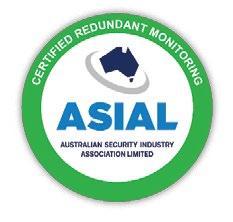
The ASIAL Security Insider Podcast series explores some of the issues and challenges facing the security industry.

EPISODE 131
ASIAL Security Industry Licensing Report 2025
8 April 2025
In this episode we dive into the newly released ASIAL Security Industry Licensing Report 2025. To help us with our discussion, we are joined by Bryan de Caires, CEO of ASIAL and Tony Keane, Head of Integrity and Security at the AFL.
EPISODE 132
Building a Roadmap for a Successful Future
22 April 2025
In this episode we speak with Ryan Williams and discuss the five most common mistakes businesses make in their growth journey and how to overcome them.
EPISODE 133
Protecting your Corporate Airspace Against Drones 25 April 2025
In this episode we speak with Oleg Vornik, CEO of Droneshield about some of the specific threats that drones pose to a company’s facilities and how drones are being used to enact those threats.
EPISODE 134
Managing the complexity of Security Convergence 9 May 2025
In this episode we discuss Converged security, specifically how to successfully develop, deliver, and manage an organisationwide model for converged security. We are joined by Penny Clarke, Managing Director of Convergence Security Consulting.
EPISODE 135
Modern Sales in Security 23 May 2025
In this episode we speak with Peter Strohkorb, one of Australia’s leading sales coaches. We look at why the traditional ‘Hard Sell’ no longer works, why modern buyers want a subject matter expert and more.
EPISODE 136
How to create greater public policing and private security co-operation 6 June 2025
In this episode we speak with Martin Gill from Perpetuity Research about the challenges and realities of creating closer partnerships between private security and public police with a view to addressing rising crime.
EPISODE 137
What does it take to be an effective security leader? 20 June 2025
In this episode we explore what it takes to be an effective security leader. Joining us is Damian McMeekin, a seasoned international risk and issues management executive.




info@classifiedsecurity.com.au
$375,000
ESTABLISHED MAROOCHYDORE
SUNSHINE COAST 1992
$330,000 p.a.
Low overheads, high profit, minimal subcontactor reliance.
Ideal for owner-operator, or business expansion. Owner available to subcontract if required.
A rare opportunity to acquire a well-established and highly reputable electronic security installation business servicing the Sunshine Coast and South-East Queensland specialising in Alarm, Access, and CCTV Systems.
Over the past 33-years, this business has built a loyal client base across diverse sectors including hotels, commercial and industrial buildings, shopping centres, supermarkets, retail stores, medical centres, and residential properties.
A Non-Disclosure Agreement and deposit are required before confidential details or formal discussions. Call Chris Cheney on 0418 894 401.
Strong reputation and long-standing clients. Handover support to maintain relationships
Reoccurring immediate revenue and future jobs scoped.
Full customer database. Hand tools, ladders, and stock on hand.
110+ active monitored clients (90 MyAlarm IP balance SCSI).
90% monitored clients are commercial.
Three-month post sale support.